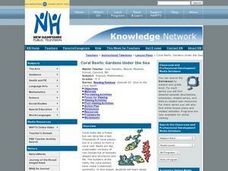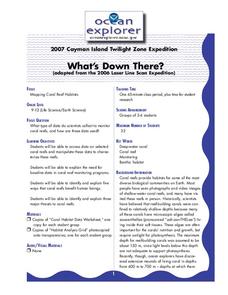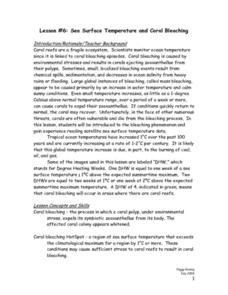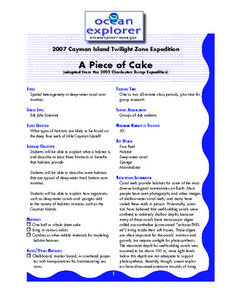Curated OER
Corrosion to Corals
Students study galvanic exchange and how it produces electric currents. In this ocean lesson students predict what metals deteriorate in salt water.
Curated OER
Coral Bleaching
Learners examine the relationship between corals and zooxanthellae, identify stresses to corals, and explain coral bleaching. In this sea life lesson students predict the effects of increased temperatures on coral reefs.
Curated OER
A Reef of Your Own
Students study the reproductive strategies of reef building corals. For this coral reef lesson students describe the behaviors of reef building corals and their nutritional strategies.
Curated OER
Coral Reefs: Gardens Under the Sea
Students discover the wonders of coral reefs while listening to a book about them. In a Reading Rainbow video activity, they simulate a dive, check equipment and explore a reef. Role-playing as marine biologists, students uncover...
Curated OER
Ocean Creature Classification
Students develop a Taxonomic Key for marine invertebrates from pictures they are given after practicing together with common objects, such as shoes. They then compare their key to a provided Ocean Invertebrates Taxonomic Key.
Curated OER
Sexy Coral Reef and I Want My Own Space
Fifth graders explore how coral polyps increase the chances of egg and sperm meeting after being released into the vast ocean waters.
Curated OER
Habitats and Adaptations
Students research and describe the habitat and adaptations of a reef animal. After the student is assigned a habitat, they design and draw a cresture adapted to eat each food and to live in each habitat.
Curated OER
Meet the Corals
Students investigate the types of coral. In this oceanography lesson, students access the Fisheye View Cam Website and create their own coral garden by using various art supplies.
NOAA
Currents
A deep ocean current circles the globe at a force that is greater than 16 times all the world's rivers combined. Groups analyze the effects of submarine topography on deep ocean current speed. They then determine how this speed affects...
Curated OER
Do Not Bleach!
Young scholars explore the importance of protecting the coral reefs. In this Oceanography lesson, student examine how coral reefs benefit humans, identify major threats to the reefs, and discuss actions to reduce these threats.
Curated OER
Predators Among Us
Students study environmental science. In this ecosystems lesson, students discover how humans have an impact on life in the coral reef. They watch video clips and work on small group activities. This lesson includes links to the videos...
Curated OER
What's Down There?
Students analyze data on coral reefs and use this to help characterize reefs. In this mapping coral reefs lesson students identify and explain the major threats to coral reefs.
Curated OER
A Reef of Your Own
Young scholars research and study the life and reproductive strategies of reef building corals. They examine how coral reefs can produce high levels of biological material when they are surviving in areas of low nutrition.
Curated OER
Easy as Pi
Students describe the importance of structural features that increase surface area in a coral reef habitat. In this investigative activity students quantify the impact of modifications on surface area in model habitats.
Curated OER
Fish Are Animals Too
Students create posters that show how a shark is a major predator in kelp forests and coral reefs after studying the food webs for these ecosystems. They determine that fish are important animals in the ocean's web of life.
Curated OER
Sustainable Southern Belize: Coral Health Lesson Plan
Fifth graders investigate coral reefs and the dangers they face by labeling and drawing. In this oceanography lesson, 5th graders view a PowerPoint presentation of photographs of coral reefs in Belize. Students investigate and...
Curated OER
Reef Sharks!
Pupils visit an ocean aquarium exhibit where they can observe Black tip reef sharks. They observe the shark's behavior and read any information exhibited on the walls. They complete a worksheet based on information collected.
Curated OER
OCEAN PAINTINGS
Fifth graders research animal life in a coral reef. They learn and use the wax-resist technique for painting, and create a picture of an ocean animal.
Curated OER
Lesson #6: Sea Surface Temperature and Coral Bleaching
Fifth graders examine the concept of coral bleaching and sea surface temperature. They view a teacher demonstration, interpret sea surface temperature data, explore a website, and complete worksheets.
Curated OER
Life on the Edge: Exploring Deep Ocean Habitats Cool Corals
High schoolers research the basic morphology of Lophelia corals and polyps to determine the significance of these organisms. They detail the reasons that biological communities are focusing on the Lophelia corals as major conservation...
Curated OER
Feeding in the Flow
The National Oceanic and Atmospheric Administration (NOAA) has developed a tremendous library of ocean-themed lessons that can be used in a variety of science settings. "Feeding in the Flow" is one of those activities; Its focus is on...
NOAA
History's Thermometers
How is sea coral like a thermometer? Part three of a six-part series from NOAA describes how oceanographers can use coral growth to estimate water temperature over time. Life science pupils manipulate data to determine the age of corals...
NOAA
Invertebrates
Crabs and lobsters ... yum! The 18th installment of a 23-part NOAA Enrichment in Marine sciences and Oceanography (NEMO) program focuses on invertebrate marine life. After the lecture slideshow, learners conduct an activity to sample...
Curated OER
A Piece of Cake: Ocean Communities
Learners explain habitats. In this model based lesson students create a model to help describe a habitat that is typical of deep-water. Learners will describe how organisms such as coral and sponges add to their habitat.

























